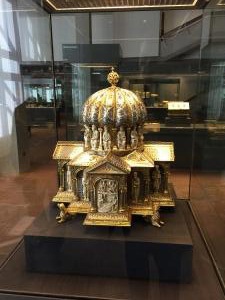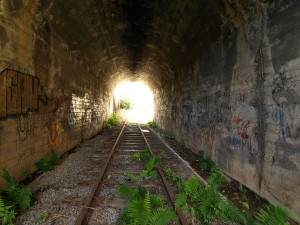Under Landmark Ruling, Germany Must Now Defend Nazi-Looted Art Claims in U.S. Court
WASHINGTON (March 31, 2017)- The United States District Court for the District of Columbia has ruled that claims over the famed Guelph Treasure can proceed against Germany in a United States court. This is the first time Germany will have to defend itself in the U.S. against allegations of looted Nazi art and artifacts. The claims arise out of the 1935 forced sale by a consortium of Jewish art dealers to Hermann Goering’s minions of the famed collection of medieval artifacts known as the Guelph Treasure. The claims were filed by clients of Sullivan & Worcester LLP against the Federal Republic of Germany and the Prussian Cultural Heritage Foundation (the Stiftung Preussischer Kulturbesitz, or SPK). The court rejected the Defendants’ arguments that they are immune from suit and held that the Plaintiffs’ claims can be considered a taking of property in violation of international law for the purpose of evaluating the court’s jurisdiction over Germany and the SPK.. Jed Leiber, Alan Philipp, and Gerald Stiebel may now proceed to litigate their claims for their property’s rightful return. Leiber, Philipp, and Stiebel are also represented by S&W’s co-counsel in this matter, Markus Stötzel and Mel Urbach, experienced counselors in the return of Nazi-looted art who have been fighting this case for over eight years and who decried Germany continuing to defend the Nazis’ and Herman Goering’s theft from Jews.
Read More
Topics:
Nazi-looted art,
Foreign Sovereign Immunities Act,
Mel Urbach,
SPK,
Stiftung Preussischer Kulturbesitz,
Hermann Goering,
FSIA,
expropriation exception”,
NS Raubkunst,
J.S. Goldschmidt,
Markus Stötzel,
Saemy Rosenberg,
Adolf Hitler,
Federal Republic of Germany,
Zacharias Hackenbroch,
Nicholas M. O'Donnell,
Welfenschatz,
I. Rosenbaum,
Paul Körner,
Wannsee Conference
Germany Runs Counter to 20 Years of International Commitments
As readers know, my clients Alan Philipp and Gerald Stiebel sued the Federal Republic of Germany and the Stiftung Preussischer Kulturbesitz (SPK) in February for restitution of the Guelph Treasure (or Welfenschatz as it is known in Germany), assisted by my co-counsel Mel Urbach, Esq. and Markus Stötzel of Marburg, Germany. As my co-counsel speak to an event tonight hosted by Congresswoman Grace Meng on the anniversary of Kristallnacht, an event inextricable to the persecution of Jews in Europe, Germany’s response to the Complaint advances a stunning revisionism about the Holocaust and the international commitments that Germany has made. While paying lip service to the seriousness of Jewish suffering, the papers filed in court are nothing less than an attempt to move the goalposts to exempt a historical period from responsibility about which there can be no serious debate. Independent condemnation was not far behind the filing.
Read More
Topics:
Grace Meng,
Simon Wiesenthal Center,
Shoah,
Adolph von Menzel,
Hans Sachs,
Washington Principles on Nazi-Looted Art,
1943 London Inter-Allied Declaration,
Dachau,
Holocaust,
Mel Urbach,
SPK,
George Eduard Behrens,
Nuremberg race laws,
Holocaust revisionism,
Stiftung Preussischer Kulturbesitz,
Marburg,
Restitution,
Los Angeles,
Gerald Stiebel,
World War II,
Markus Stötzel,
Saemy Rosenberg,
Deutsches Historisches Museum,
Reichskristallnacht,
Isaac Rosenbaum,
Lucie Ruth Hackenbroch,
Federal Republic of Germany,
Zacharias Hackenbroch,
Pariser Wochentag,
Rabbi Abraham Cooper,
Paris Weekday,
Alan Philipp,
Welfenschatz,
Military Government Law 59,
Frankfurt
I mostly ignored the initial twitterings about a supposedly secret train laden with gold and other Nazi-looted treasures that was buried somewhere near Wrocław, formerly Breslau, in Poland. My reasons were straightforward: just like supposed sightings of the Gardner Museum heist art, or the Amber Room, the story had all the hallmarks of a fable being peddled by someone who, perhaps not coincidentally, was suggesting that they be paid something for their trouble. Whether this is the next Gurlitt saga or just Al Capone’s vault, it’s too early to tell.
Read More
Topics:
the Holy Roman Empire,
Al Capone’s vault,
Soviet,
Gauleiter Karl Hanke,
Königsberg,
Cornelius Gurlitt,
Breslau,
Wrocław,
Prussia,
Max Liebermann,
East Prussia,
Red Army,
Nazi Gold Train,
Amber Room,
Bernsteinzimmer,
the Hanseatic League,
Walbrzych,
Restitution,
Deputy Culture Minister Piotr Zuchowski,
World War II,
Markus Stötzel,
Poland,
the Duchy of Silesia,
Bohemia,
Riders on the Beach,
David Friedmann,
the Kingdom of Poland,
Gardner Museum heist,
the German Empire





